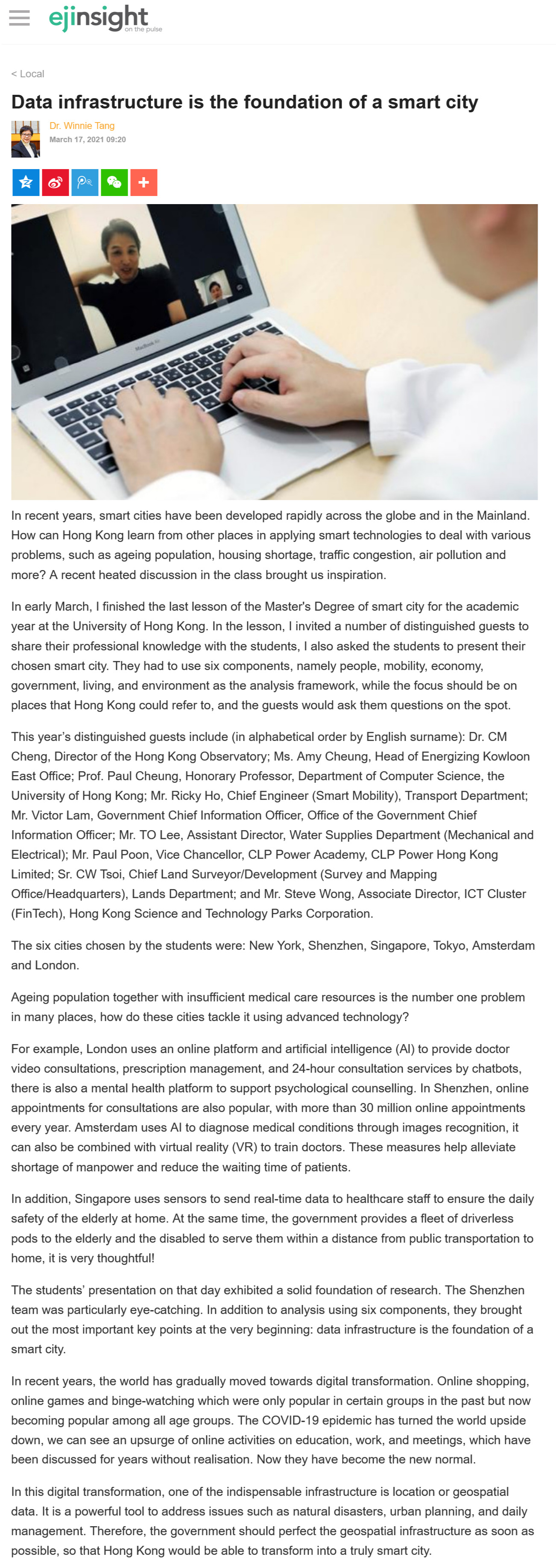網上版請按此

Data infrastructure is the foundation of a smart city
In recent years, smart cities have been developed rapidly across the globe and in the Mainland. How can Hong Kong learn from other places in applying smart technologies to deal with various problems, such as ageing population, housing shortage, traffic congestion, air pollution and more? A recent heated discussion in the class brought us inspiration.
In early March, I finished the last lesson of the Master's Degree of smart city for the academic year at the University of Hong Kong. In the lesson, I invited a number of distinguished guests to share their professional knowledge with the students, I also asked the students to present their chosen smart city. They had to use six components, namely people, mobility, economy, government, living, and environment as the analysis framework, while the focus should be on places that Hong Kong could refer to, and the guests would ask them questions on the spot.
This year's distinguished guests include (in alphabetical order by English surname): Dr. CM Cheng, Director of the Hong Kong Observatory; Ms. Amy Cheung, Head of Energizing Kowloon East Office; Prof. Paul Cheung, Honorary Professor, Department of Computer Science, the University of Hong Kong; Mr. Ricky Ho, Chief Engineer (Smart Mobility), Transport Department; Mr. Victor Lam, Government Chief Information Officer, Office of the Government Chief Information Officer; Mr. TO Lee, Assistant Director, Water Supplies Department (Mechanical and Electrical); Mr. Paul Poon, Vice Chancellor, CLP Power Academy, CLP Power Hong Kong Limited; Sr. CW Tsoi, Chief Land Surveyor/Development (Survey and Mapping Office/Headquarters), Lands Department; and Mr. Steve Wong, Associate Director, ICT Cluster (FinTech), Hong Kong Science and Technology Parks Corporation.
The six cities chosen by the students were: New York, Shenzhen, Singapore, Tokyo, Amsterdam and London.
Ageing population together with insufficient medical care resources is the number one problem in many places, how do these cities tackle it using advanced technology?
For example, London uses an online platform and artificial intelligence (Al) to provide doctor video consultations, prescription management, and 24-hour consultation services by chatbots, there is also a mental health platform to support psychological counselling. In Shenzhen, online appointments for consultations are also popular, with more than 30 million online appointments every year. Amsterdam uses AI to diagnose medical conditions through images recognition, it can also be combined with virtual reality (VR) to train doctors. These measures help alleviate shortage of manpower and reduce the waiting time of patients.
In addition, Singapore uses sensors to send real-time data to healthcare staff to ensure the daily safety of the elderly at home. At the same time, the government provides a fleet of driverless pods to the elderly and the disabled to serve them within a distance from public transportation to home, it is very thoughtful!
The students’ presentation on that day exhibited a solid foundation of research. The Shenzhen team was particularly eye-catching. In addition to analysis using six components, they brought out the most important key points at the very beginning: data infrastructure is the foundation of a smart city.
In recent years, the world has gradually moved towards digital transformation. Online shopping, online games and binge-watching which were only popular in certain groups in the past but now becoming popular among all age groups. The COVID-19 epidemic has turned the world upside down, we can see an upsurge of online activities on education, work, and meetings, which have been discussed for years without realisation. Now they have become the new normal.
In this digital transformation, one of the indispensable infrastructure is location or geospatial data. It is a powerful tool to address issues such as natural disasters, urban planning, and daily management. Therefore, the government should perfect the geospatial infrastructure as soon as possible, so that Hong Kong would be able to transform into a truly smart city.
Dr. Winnie Tang
Adjunct Professor, Department of Computer Science, Faculty of Engineering; Department of Geography, Faculty of Social Sciences; and Faculty of Architecture, The University of Hong Kong